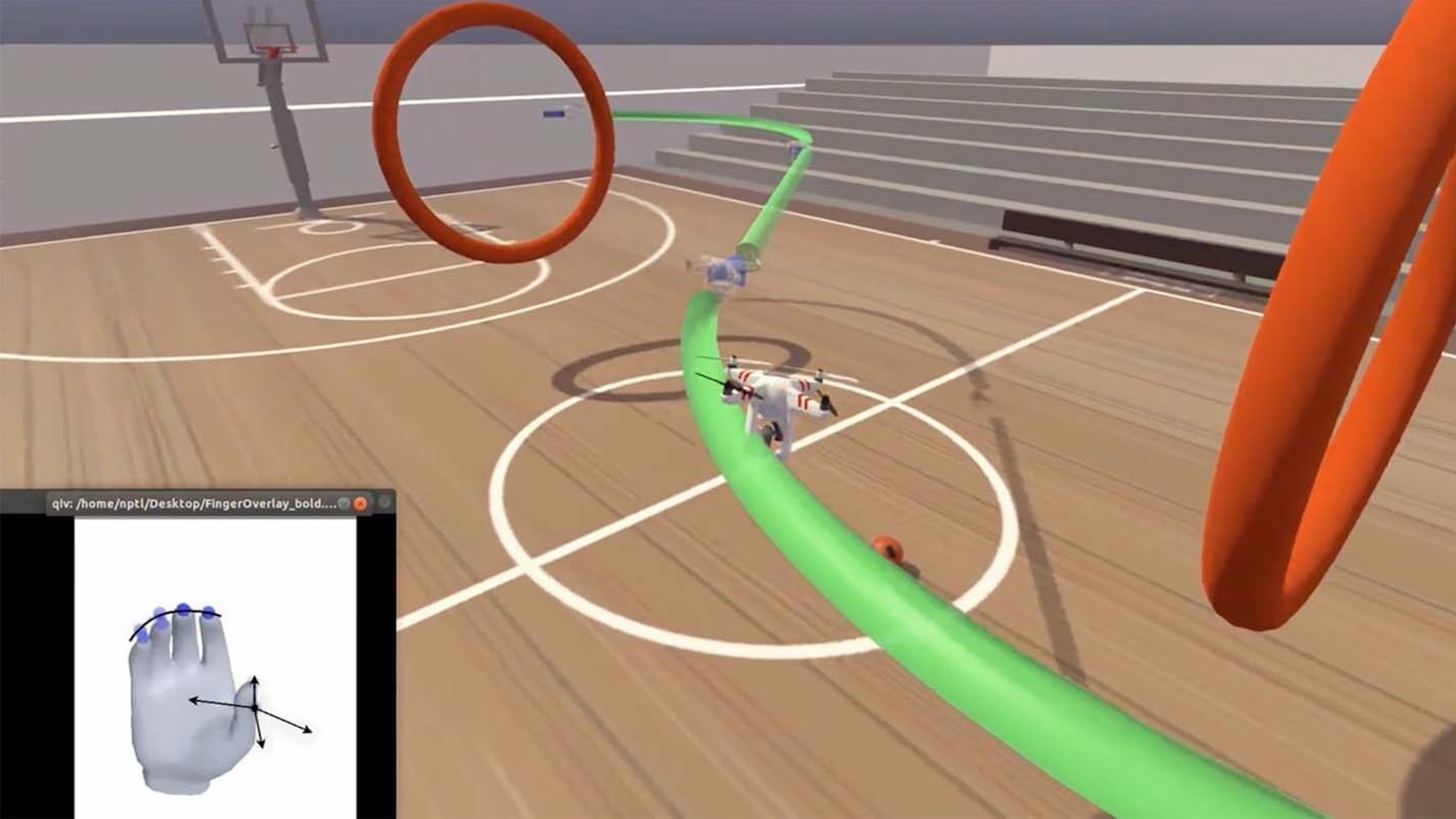WWW.POPSCI.COM
Patient with paralysis uses mind to pilot virtual quadcopter
A screenshot of the game display shows the quadcopter following a green path around the rings. The inset shows a hand avatar. The neural implant records from nearby neurons and algorithms determine the intended movements for the hand avatar. The finger positions are then used to control the virtual quadcopter. Credit: University of Michigan / Nature MedicineShareMultiple brain-computer interface (BCI) projects are currently underway, but BrainGate is one of the first aimed at motor restoration in users affected by neurodegenerative disorders and spinal cord injuries. Researchers have spent years working through the devices clinical trial phases, but their most recent breakthrough isnt focused on physical accomplishments. Instead, the latest achievements could pave the way for people with disabilities to more easily utilize complex computer software, communicate with loved ones, work remotely, and even make music.According to a study published by BrainGate engineers on January 20 in the journal Nature Medicine, a volunteer with quadriplegia can now maintain unprecedented control over a virtual object using their surgically implanted BrainGate BCI device. To demonstrate the ability, the patient guided a virtual rotocopter through hoops in a digital obstacle course by simply thinking about moving the fingers on one of their hands.This is a greater degree of functionality than anything previously based on finger movements, Matthew Willsey, study first author and a University of Michigan assistant professor of neurosurgery and biomedical engineering, said in an accompanying announcement.Noninvasive BCI technology already exists to help users with physical restrictions operate computer software and video games, often relying on electroencephalography (EEG) signals. Willsey and his colleagues, however, note that these methods require analyzing larger regions of the brain beyond the motor cortex. Because of this, the engineers believe placing microthin electrode wiring closer to the actual neurons allows for the restoration of more precise motor control.[BrainGate2] takes the signals created in the motor cortex that occur simply when the participant tries to move their fingers and uses an artificial neural network to interpret what the intentions are to control virtual fingers in the simulation, said Willsey.The updated BrainGate BCI system works by analyzing the users hand in three partsthe thumb, then the index and middle fingers, followed by the ring and pinky fingers. Each section is also defined by its horizontal and vertical movements. To guide a virtual quadcopter through its digital obstacle course, the BCI user only needs to think about moving those hand groupings as needed to fly the vehicle through the floating hoops.The volunteer, who cannot move their limbs after sustaining a spinal cord injury many years ago, has worked with Willseys team since 2016. But unlike some of the previous trials, this one was specifically tailored to their interests. Get the Popular Science newsletter Breakthroughs, discoveries, and DIY tips sent every weekday. By signing up you agree to our Terms of Service and Privacy Policy.The quadcopter simulation was not an arbitrary choice, the research participant had a passion for flying, added Donald Avansino, study co-author and a computer scientist at Stanford University. While also fulfilling the participants desire for flight, the platform also showcased the control of multiple fingers.According to the teams results, the BrainGate array wired directly to motor neurons offered a sixfold improvement on the users quadcopter piloting when compared to an EEG system. This digital precision may soon extend much further than copter steeringit could allow for greater connectivity between the BCI user and their friends and loved ones.People tend to focus on restoration of the sorts of functions that are basic necessitieseating, dressing, mobilityand those are all important, explained Jaimie Henderson, a neurosurgery professor at Stanford and study co-author. But oftentimes, other equally important aspects of life get short shrift, like recreation or connection with peers. People want to play games and interact with their friends.Henderson said there are also practical implications to the BCI improvements showcased in the quadcopter trialsthe ability to control multiple virtual fingers allows for multifactor control schemes for all kinds of things, including using CAD software and composing music.
